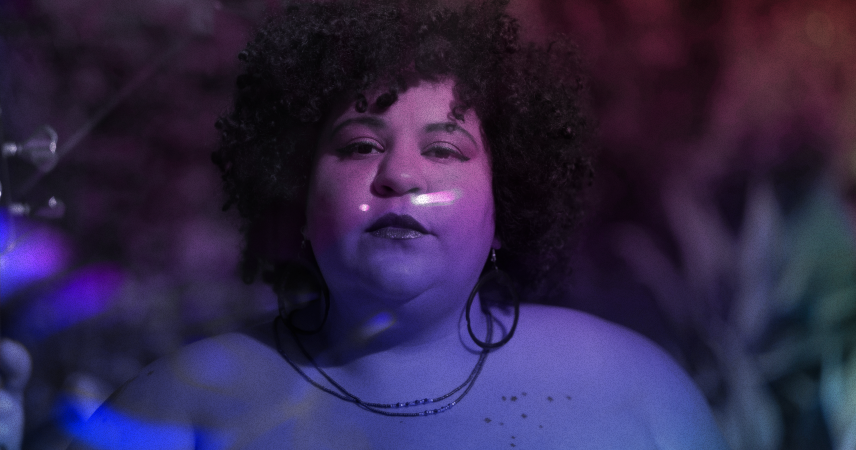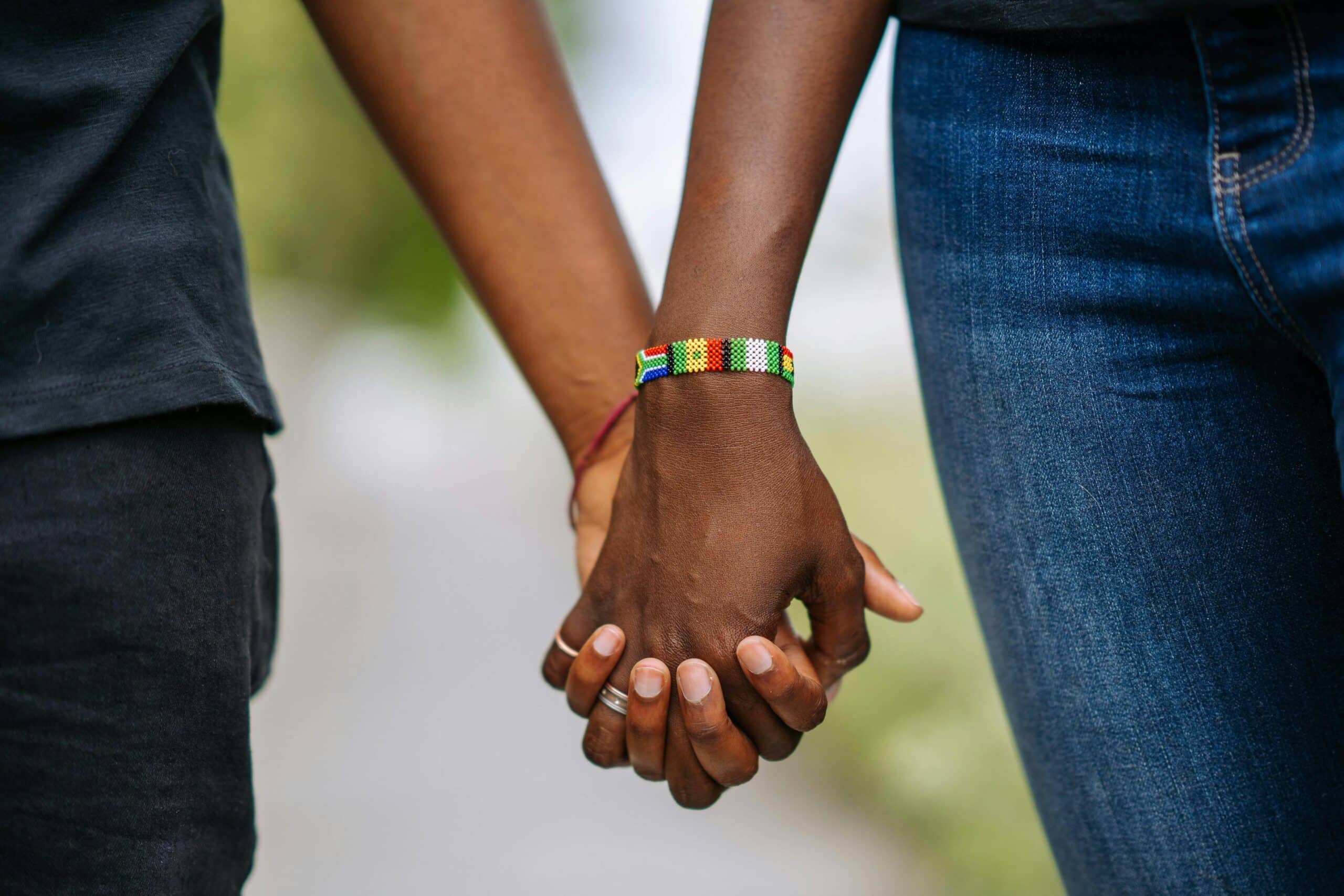How To Start Exploring Intimacy and Pleasure When You’re Ace

This year, I had the pleasure of partnering with Taimi and The Pleasure Project for my latest creative endeavor: Velvet. Velvet is a 7-episode fiction podcast that dives into the depth of intimacy and pleasure that asexual people can experience, beyond sex.
Throughout the process of writing and directing the episodes, and even during production, I’ve had some eye-opening conversations about how society equates pleasure with sex. Even more important, I’ve realized how asexual people are often left out of conversations about pleasure, attraction, and desire. There’s a common misconception that asexual individuals can’t experience these things unless sexual attraction is involved, but that’s just not the case.
As a writer, I’ve penned a few pieces on asexuality, including MY JOURNEY TO ASEXUALITY, and PASSION & INTIMACY FROM AN ASEXUAL LENS.
However, one focal point I wanted to explore here is: where to start. Once you realize you’re asexual and know that you don’t experience sexual attraction, you may still find yourself desiring closeness and intimacy, without it being sexual. You understand this about yourself, but how do you communicate that to a partner? Where do you even begin?
It Starts by Getting Comfortable with Saying the Thing Out Loud
Often, when we step outside the lines of what’s considered ‘normal’ or hold opposing truths, we find it hard to express who we are, what we want, and what we need. For a while, I’ll admit, it felt silly. It felt silly to say that the scene in movies where a couple is passionately kissing after a delicious date night, struggling to find the keys because they can’t stop focusing on their lips long enough to unlock the door, nearly falling on top of each other the moment the door opens, is the passion I desire, but without it leading to sex.
It felt silly to say that clitoral orgasms are the greatest sensation I’ve ever experienced and that I crave my vibrator in the way most people crave partnered sex. It felt silly to say that dirty talk seemed performative and unnatural, but having a partner guide your breath while you use your vibrator was the type of participation I yearned for, without even being touched by them.
It felt silly to say that sobbing in someone’s arms, not being stopped but encouraged to release, felt more intimate than sex ever did. It felt silly to say that eye contact with someone I found aesthetically stunning was the thing that lit a match inside me, igniting an urge I couldn’t explain, yet no sexual desire followed.
I knew these things. I knew them well. But knowing them and being able to articulate them? Two completely different things.
Because I was afraid of being met with laughs, afraid of being belittled. I was used to being told that I was a ‘tease.’ But the truth is, I simply hadn’t yet built the confidence to express what I wanted, without the crushing weight of shame.
It wasn’t until I realized that if I was ever going to experience the type of intimacy I truly wanted, I had to be able to express it and communicate it. Otherwise, it literally wasn’t going to happen.
I started by journaling. Detailing exactly what I yearned for, without the weight or anxiety of having a listener on the other side who could reject or belittle my desires.
It started by detailing what I found attractive and desirable. What are the exact sensations I enjoy, and why? In what ways do I find someone attractive? And from there, how do I express that attraction, or act on it?
I’m a person who craves depth. I loathe small talk and prefer the communicative equivalent of ripping off the band-aid, building trust through sharing the innermost parts of myself with those who meet me at that level.
I love touch. The warmth and comfort of an embrace, the weight of someone holding me close, physically wrapped in their arms. Touch also includes subtle gestures, like a hand placement that says “I want you near me.” The caress of a lover’s hand on my neck, just below the ear, when they’re speaking softly to me. Being pulled in by my waist or feeling a hand rest gently on my thighs. These are the ways I crave connection.
Kissing is another huge thing for me. It’s the synchronization of breath, the delicate push and pull. There’s something electrifying about the way two people align, not just in movement, but in energy, exchanging warmth, desire, and tenderness, all without a single word being spoken. It’s a dance, where each kiss builds on the last, layering emotions, sensations, and intimacy. It’s not just physical, it’s a conversation between two bodies, an unspoken rhythm that speaks louder than words ever could.
It took me years to understand that you can enjoy orgasms without necessarily enjoying sex. When I first came out as ace, I thought I was demisexual. I experienced what Angela Chen described as “a physical manifestation of an emotional response.” For a few months after coming to terms with my ace identity, I assumed I only desired sex if it felt deeply emotionally connected. I only liked sex when it didn’t feel like sex- it had to feel like love. But as I grew to understand myself as asexual, I realized that the emotional closeness and intimacy I so deeply desired could exist entirely on its own, absent of sex. I also learned that the orgasms I craved regularly were not rooted in emotional intimacy at all; they were simply a sensation craving.
Orgasms, in and of themselves, are about sensations. You don’t need partnered sex (whether penetration or oral sex) to have an orgasm. All you need is stimulation in the right place, with the right pressure and intensity. This realization wasn’t just a shift in perspective; it was about fully embracing the fact that pleasure doesn’t always need to be tied to a partner, and that orgasm doesn’t require sexual attraction or the complexities of partnered sex.
For some asexual individuals, partnered sex is still something they enjoy for the physical sensations, even if they don’t experience sexual attraction. They find pleasure in the act itself, separate from any emotional or sexual attraction. They may enjoy penetration, oral sex, or a combination of the two. They also may enjoy sex if it feels emotionally connected. But I’m not that ace. I don’t experience sexual attraction, nor do I crave partnered sex because of the experience of sex itself.
To me, the experience of sex, which all too often is painted as the pinnacle of desire, feels nothing like what orgasms or emotional connection feel like. When it comes to partnered sex, there has to be a lot of consideration for the other person. It’s less about you and more about us, ensuring both partners are enjoying the experience. The time and effort it takes to find the rhythm that works for both, only for the orgasm to maybe or maybe not happen, is one of the reasons why it’s not something I crave. For me, when I experience an orgasm, I am deeply in my body. Another person’s genitals, instead of enhancing my experience, becomes a hindrance, a distraction. The physical closeness may even interrupt the sensations that I’m experiencing on my own.
I know many people say, “It’s not about the orgasm, it’s about the sex.” But for me, I disagree. What I want and crave is the sensation of the orgasm itself. And partnered sex doesn’t fulfill that desire for me. When I crave intimacy and closeness, I find that in emotional connection, romance, kissing, and cuddling. When I want an orgasm, it’s not about any of that. It’s about the sensations, the pressure, the intensity, and the feeling of release, which I could never get because a partner is in the way.
If a partner truly desires to participate in my orgasm, one way they could do so is through tantric practices, specifically breathing exercises. Tantric breathing is about synchronizing our breath, creating a shared rhythm that connects our energy. In this practice, a partner can guide my breath, helping to amplify the sensations I’m experiencing, while still allowing the orgasm to be deeply personal. To me, it’s about feeling safe in the vulnerability of experiencing an orgasm, with my partner present as a witness and supportive presence to that pleasure.
I wrote this all in my journal.
And after writing my deepest, most passionate cravings, I realized something: most times we SAY what we’re trying to say while we’re busy figuring out how to say it.
It wasn’t about sugarcoating or making something palatable. It was about being honest. Just like people talk openly about their sexual desires, I realized I should be able to discuss my non-sexual desires with the same level of openness and without any shame.
So this turned into what I called a ‘pleasure wishlist,’ experiences I wanted to have and incorporate into my romantic relationships that centered on pleasure, not sex.
It also became a really fun conversation starter with lovers and partners once I started dating after coming out. It made me a lot more confident in articulating the nuances of my sexual orientation and desires. Saying I was asexual was one thing, but explaining what that means for me was completely different.
The Aftermath – Lean In
One thing I’ll caveat is that I’m polyamorous, so I’m in a slightly different boat than monogamous aces, who may face different challenges when navigating desire discrepancies within relationships. For me, having multiple partners means they can get their sexual desires met outside of our relationship. That said, rejection is something that all aces, regardless of monogamy or non-monogamy, know intimately. We live in a world where sex is often painted as mandatory. Almost like a litmus test for the health of a relationship or whether or not your partner truly desires you. When sex is off the table, for many people, that’s a deal breaker.
What helped me was changing the narrative. This wasn’t about me being rejected; it was about setting a boundary. Dating and connection-building, at their core, are about compatibility. If my desires (or lack thereof) don’t align with someone else’s, then we’re just not compatible romantically. It’s less about me as a person and more about whether our desires are a fit. Centering desire, rather than my personal worth, softened the blow of rejection.
To my surprise, it also opened the door for me to experience the exact type of intimacy that I had been craving for most of my adult life, but didn’t know how to articulate. A green flag for me is when I say I’m asexual and someone asks, “What does that mean for you?” rather than assuming. That simple question opens the floor for me to explain myself, and it’s led me to a partner who appreciates the fact that he doesn’t have to perform in our relationship. There’s no pressure to sexually satisfy me, and that’s created space for him to explore intimacy in ways he hadn’t considered before.
I’ve also been told, “I love the fact that I can just be naked around you. You’re not grabbing on me or assuming that just because I’m getting out of the shower, it means we’re about to have sex.” It’s been eye-opening for him to be in a romantic relationship with me because I value someone for what they bring to my life beyond sexual performance or capability.
Being ace has opened the door for so many conversations, relationships, and moments of connection that I didn’t think were possible.
It’s also taken the anxiety out of dating and made space for me to really lean into romance. For years, I held back how much I loved dates, touch, making out, and even eye contact, all because of a fear that sex would be expected. I learned to suppress my romantic desires because I didn’t want them to be conflated with a desire for sex. But being openly ace and being able to articulate the type of intimacy I want has opened the door to some of the spiciest, most delicious dates of my life.
It’s also made me pay closer attention to energy. One can have dominant or submissive energy and enjoy either dynamic without it being inherently sexual. This can be expressed through practices like rope play or shibari, where a rigger and a partner explore power dynamics without it leading to sex. It can also be as simple as letting your partner take the lead or guide your lips when you kiss- those small, intimate moments of surrender or control, where the energy shifts, but the focus isn’t on sex itself.
A more dominant expression could be taking charge of the situation by setting the pace, like initiating a kiss and pulling your partner closer, or guiding the direction of the date to match your desires. It’s a way to step into that power while maintaining the focus on connection, not performance.
Conclusion
To anyone reading this, I want you to know that the nuance of what you desire matters. And no, it’s not too complicated, too awkward, too unusual or too layered. Desire, pleasure, and attraction are not supposed to be one size fits all. You’ll never get to the intimacy you deserve if you’re not honest about what it is that you want, And you’ll never get what you want if you don’t express it without shame. I hope this article encourages anyone reading, especially those on the asexual spectrum, to dive head first into interrogating and articulating their desires.
This is exactly what Velvet is about. I hope listeners enjoy the episodes as they were written with such intention and personal experiences that I know others have experienced as well.
I hope the takeaway is that intimacy can be full of pleasure and so incredibly fulfilling when you stop trying to make it fit into someone else’s idea of what it should be.



